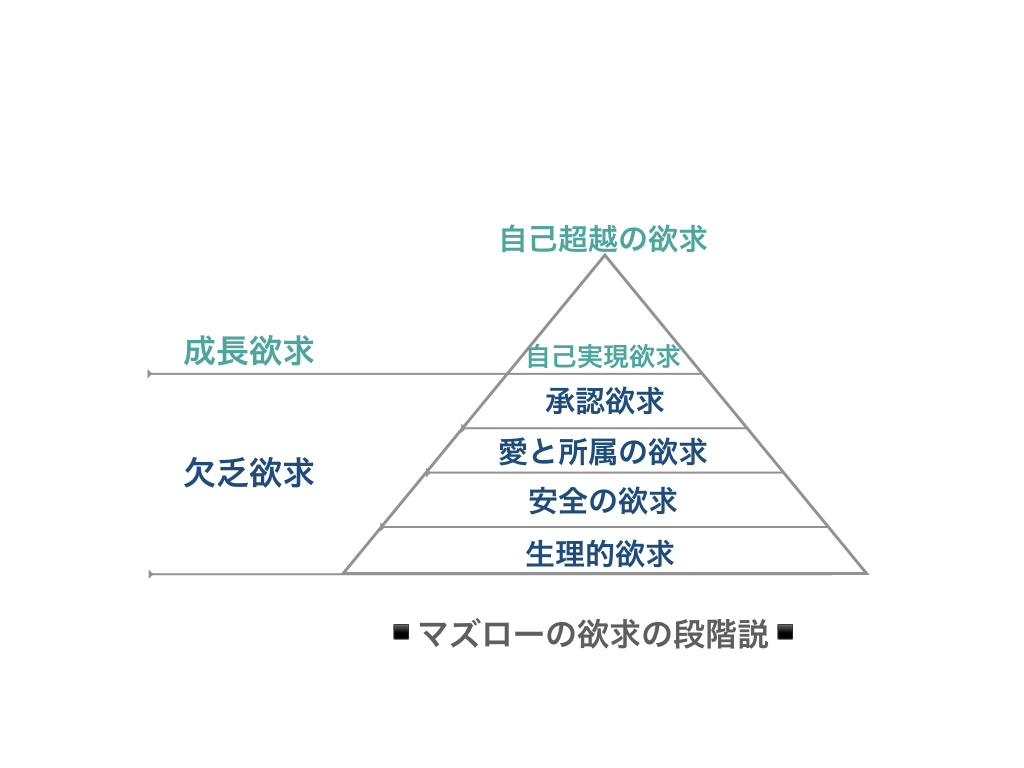
アメリカの心理学者、アブラハム・マズロー(1908—1970)は、プロフェッショナル人生をかけて「人生の意味」について探求した心理学者です。
そして、人間が持つ「成長したいという欲求」を明らかにして、心理学の第3の勢力である人間性心理学を牽引しました。
そんなマズローが、1943年彼が35歳の時に”A Theory of Human Motivation”(人間の動機づけに関する理論)を発表し、欲求の段階説を提唱しました。
この理論で、マズローは人間の行動のモチベーションの基礎を作る、5つの核となる欲求を指摘します。
① 生理的欲求 → 食べたい、飲みたい、眠りたい
② 安全の欲求 → 自分の身の安全を確保したい
③ 愛と所属の欲求 → 集団に属したい/愛されたい
④ 承認欲求 → 自分の価値を認められたい
⑤ 自己実現欲求 → 自分の持っている可能性を発揮したい
マズローは「人間は自己実現に向かって絶えず成長する」と仮定し、この5つの欲求は、1番から順に現れて、その欲求が完全にではなくてもある程度満たされることで、次の欲求が現れると考えました。
つまり、食べるものや水が無い状態、眠れないような状態では、それを手に入れることが第一優先となり、「周囲の人から認められたい」といった承認欲求は出てこないということになります。
(ただ、晩年のマズローはこの階層的に欲求が現れるということを否定したという説もありますし、近年ではこれらの基礎的な欲求についての見直しも行われています)
そしてこの5つの欲求のうち、5番目の自己実現欲求を「成長欲求(growth need)」と呼び、それ以外の1から4までの欲求と分けました。
1から4までの欲求は、「欠乏欲求(deficiency needs)」と呼び、それが満たされない時、足りないと感じる時には、不満感、苦しみ、不足感を感じるものです。
例えば、病気、飢餓感、孤独、自己不信といったものは、この欠乏欲求が満たされないことによる副産物です。
一方で、成長欲求はあなたを幸せにしてくれるものですが、それが満たされないからといって苦しみは生み出しません。こうして、マズローはこの1から4までの基盤となる欠乏欲求が満たされた時に、自己実現欲求が優先されると言います。
ですからマズローの説によると、「自己実現欲求」を満たして幸せになるには、まずは1から4までの欲求をちゃんと認めて、それを満たすことが優先だと言うことになります。
ただ面白いことに、一度4番目までの基盤となる欠乏欲求をきちんと満たした経験があると、この欠乏欲求が満たされないことに対して耐性ができるといいます。そのため、この4つが満たされないような状況でも、自己実現のために活動することができるようになるのです。
マズローは、上位の欲求は下位欲求が満たされることで出現すると考えましたが、実際にはそうした順番通りに行かないことを経験されている方も多いのではないでしょうか。
例えば、愛と所属の欲求は満たされているのに、仕事が安定しないことによって、あるいは健康を害してしまったことで安全欲求が満たされないこともあります。
あるいは、周囲の人と本当に深い信頼関係で繋がったり、受け入れられている感覚を感じられないまま、つまり愛と所属の欲求が満たされないままに、それを埋め合わせるように、承認欲求を満たそうとしたり、自己実現に走ってしまうこともあるでしょう。
もちろん、だからと言ってそれが悪いわけではありませんが、自分が本当に満たそうとしている欲求は何なのか、穴が空いてしまっている欲求は何なのかを、マズローの欲求から振り返ってみることは大事かも知れません。
これらの欲求は、全て満たされている人が価値があるとか、人間として上だというようなものではもちろんありません。全ての欲求を満たすことが出来ないような状況に置かれていることもあると思います。
ただ、やはりこれらの欲求は、無視したり、軽視するのではなく、認めて、引き出して、満たしてあげることによって、より健康に、そして幸せな気持ちを感じられることには違いありません。
また、これらは人と比べるようなものではありません。例えば、自分の置かれた状況のなかで「安全」だと感じられるために今の自分に出来る小さな事をしてみる、人との繋がりを感じるために今、自分の周囲にいる人を大事にしてみたり心を開いてみる、承認欲求を満たすために、小さなチャレンジをしてみる。
今の自分にとって可能な事を少しずつ、を積み重ねていく事で、そうした欲求を自分なりに満たして行ってあげることは出来るのではないかと思いますし、その姿勢が重要ではないかと思います。
では、自己実現欲求が満たされるとどうなるのでしょうか?そこで終わりでしょうか?
実は、マズローは晩年に、5番目の「自己実現の欲求」の後に⑥「自己超越の欲求」と言うものを付け足しました。
本来マズローは5番目の「自己実現」の中に「至高体験(Peak experience)」という概念を含めていました。
至高体験とは、日常的な意識とは異なる変性意識状態であり、マズローは”至福と達成感の瞬間”(moments of highest happiness and fulfillment)と表現しました。
また、それは"稀で、刺激的で、大洋のようで、深く感動的で、爽快で、高揚感のある体験で、現実を知覚するための高度な様式を生み出し、実験者に与える影響は神秘的で魔法のようなものでさえある" (”rare, exciting, oceanic, deeply moving, exhilarating, elevating experiences that generate an advanced form of perceiving reality, and are even mystic and magical in their effect upon the experimenter.”)と言っています。
そこに暗示されているのは、この至高体験が小さな自分というものが溶解していくような、自己超越的なものであるということです。
つまりマズローは最初から自己実現の中にこうした自己超越的な体験を含めていたのですが、自己実現欲求が様々な人や領域で注目されるにつれて次第に単純化されていってしまったという背景があるのです。
自己超越の重要性についてマズローは、こんな風に言います。
“超越とは、手段というよりも目的として、自分自身、重要な他者、人間一般、他の種族、自然、コスモス(宇宙)に対して、行動し関わる、非常に高く最も全体的な、あるいはホリスティック(包括的)な人間の意識のレベルを指します。”
“Transcendence refers to the very highest and most inclusive or holistic levels of human consciousness, behaving and relating, as ends rather than means, to oneself, to significant others, to human beings in general, to other species, to nature, and to the cosmos” .
「自己超越欲求」については、後ほど、各欲求を一つずつ見ていくときにまた詳しく紹介します。
それでは、ここからは、それぞれの欲求を一つずつ見てみます。
① 生理的欲求(Physiological needs)

ここには生き物としての、もっとも基礎的な身体的・生理的・本能的欲求が入ります。いわゆる3大欲求と呼ばれる、食欲、睡眠欲、性欲だけでなく、呼吸、水分、休息、排泄に対する欲求も、この生理的欲求に該当します。
水の中で溺れそうになっている人は、酸素、呼吸することを求めて、無我夢中でもがくように、呼吸ができなくてはそれ以外のことは何も考えられないくらいの重要な欲求です。これらの欲求を、きちんと満たすことが全ての出発になります。
② 安全の欲求(Safety needs)

生命のベースとなる生理的欲求が満たされると、次に出てくるのは「身の安全を確保したい」という欲求です。
これは、普段、平和な日本で生活を送っている方にはピンとこないかも知れませんが、災害にあった時など急にそれらは切実な欲求となりますし、収入が安定しない仕事をされている方は「安定した仕事に就きたい」と感じる時には、この「安全の欲求」がモチベーションになっています。
急に仕事を失ったり、様々な事情で仕事や家を失ってしまった方にとっては、自分の身を安全に守れる場所の確保、経済的な安定が一番の優先事項になります。それが得られない状況の中で、「どうやったら自分の可能性を最大限に発揮できるだろうか」という欲求は出現しないのです。
また、この「安全の欲求」には「感情的な安定」「健康の安心・安定」といったものも含まれますので、精神的な病を抱えていたり、身体的な病気になってご自分の健康に不安を感じている方にとっても、この安全感・安心感が満たされていないと感じるでしょう。
③ 愛と所属の欲求(Love and belonging needs)

さて、生理的欲求、安全の欲求が安定して得られると、次に出現する欲求は「愛と所属の欲求」です。
この欲求は、社会的欲求と呼ばれることもありますが、例えば、同僚のチームに属することから、組合、クラブあるいは趣味のグループなどの一員として受け入れられていると感じる時に「自分が社会に必要とされている、果たせる社会的役割がある」という感覚が得られ、この欲求は満たされます。
また、他者に受け入れられている、どこかに所属し、そこで受け入れられているという感覚も「愛と所属の欲求」が満たされるのに重要ですが、例えば、それらは友情、家族(両親、兄弟姉妹、子供)、夫婦・パートナーとの間に身体的・感情的な親密さ、絆が感じられることによって満たされます。
④ 承認欲求(Esteem needs)

ここからは、自我(エゴ)によって突き動かされる欲求となります。
承認欲求の主な要素は、自己肯定感(自分は価値がある存在で尊重を受けるに値すると信じられること)と自尊心(自己成長と何かを達成する可能性に自信が持てること)です。
承認欲求には、2つのタイプがあるとマズローは言います。
一つは他者からの尊敬や承認に基づく自尊心、そしてもう一つは、自己信頼感や自律性を得ることで出現する自尊心で、他者からの評価よりも自己評価に基づくものです。
◽️ 他者からの尊敬や承認に基づく自尊心・・・他者からの評価、地位、他者との比較による優越、名誉といったものを求める欲求
◽️ 自己評価に基づく自尊心・・・スキルの熟達、自己の能力への自信、何かを達成すること、自由と独立といったものを求める欲求
⑤ 自己実現欲求(Self-actualization needs)

こうして1から4までの欠乏欲求が満たされた時に、優先される欲求が自己実現欲求です。
自己実現欲求とは、自分の持つ人としての最大限の可能性を発揮したい、それを具現化したいという欲求です。
マズローは自己実現の欲求について、こんな風に言います。
”自分自身、最高に平穏であろうとするなら、音楽家は音楽をつくり、美術家は絵を描き、
詩人は詩を書いていなければいけない。人は、自分がなりうるものにならなければいけない。人は、自分自身の本性に忠実でなければならない。このような欲求を、自己実現の欲求と呼ぶことができるであろう”
マズローは自己実現を果たしたと思われる個人を研究し、自己実現者に見られる共通の特徴を見出しました。彼が研究した人の中には、アブラハム・リンカーン、トーマス・ジェファーソン、アルバート・アインシュタインなどがいます。
マズローがMotivation and Personality(『動機と人格』)の中で挙げた自己実現者の特徴のうち、主要なものをあげてみます。(訳は筆者によるものです)
1) Self-actualized people embrace the unknown and the ambiguous.
自己実現した人は、未知のものや曖昧なものを受け入れる。
2) They accept themselves, together with all their flaws.
すべての欠点と一緒に自分自身を受け入れる。
3) They prioritize and enjoy the journey, not just the destination.
目的地だけでなく、旅を優先して楽しむ。
4) While they are inherently unconventional, they do not seek to shock or disturb.
本質的に型にはまらないが、ショックを与えようとしたり、邪魔をしようとはしない。
5) They are motivated by growth, not by the satisfaction of needs.
欲求を満たすことではなく、成長によって動機づけられている。
6) Self-actualized people have purpose.
自己実現した人には目的がある。
7) They are not troubled by the small things.
些細なことで悩まない。
8) Self-actualized people are grateful.
自己実現した人は感謝している。
9) They share deep relationships with a few, but also feel identification and affection towards the entire human race.
少数の人々と深い関係を共有しているが、全人類に対する一体感と愛情も感じている。
10) Self-actualized people are humble.
自己実現している人は謙虚である。
11) Self-actualized people resist enculturation.
自己実現した人は周りの文化に組み込まれることに抵抗する。
12) Despite all this, self-actualized people are not perfect.
にもかかわらず、自己実現している人は完璧ではない。
注意したいのは、これらの記述は「自己実現者になるためのチェックリスト」ではありませんし、これらを全て満たしていないと自己実現者にはなれないというようなものでもありません。
⑥ 自己超越欲求(Self-transcendence needs)

1971年に出版されたマズローのThe Farther Reaches of Human Nature(『人間性の最高価値』)という本の中に、”Theory Z”(Z理論)という章があります。
その書き出しは、こうです。
“私は最近、自己実現している人々を二種類(あるいはより良いもの、度合い)に区別することがますます有用であることに気がついたのです。明らかに健康ではあるが超越の経験をほとんど、あるいは全くしていない人々と、超越的な経験が重要であり中心的でさえある人々です。”
“I have recently found it more and more useful to differentiate between two kinds (or better, degrees) of self-actualizing people, those who were clearly healthy, but with little or no experiences of transcendence, and those in whom transcendent experiencing was important and even central.”
冒頭でも書いたように、マズローが晩年になって自己実現した人々の中にさらに二種類の人々の違いを区別し、自己実現欲求の次に来るものとして追加したのが自己超越欲求です。
そして、自己実現者と自己超越者の最も大きな違いとして挙げたのが「至高体験」の重要性、「在ること」への認識、そして「高原体験(plateau experience)」です。
(*「高原体験(プラトー体験)」とは、至高体験よりも、感情的ではなくより穏やかで静かな、自発的に体験できる、驚異や一体感、「在ること」の価値に対する反応としてマズローが名付けたものです。
では自己超越における次元として重要視した「至高体験」について、もう少し見てみます。マズローは、至高体験をこんな風にも表現しています。
“ビジョンに無限の地平が開けていく感覚、かつてよりも力強く同時に無力になっていく感覚、大いなる恍惚感と驚異と畏敬の念、時間と空間における定位の喪失感、最後に、非常に重要で貴重なことが起こったという確信を得て、その対象者はこのような体験によって、日常生活においてもある程度変容し、強化されていく。”
"feelings of limitless horizons opening up to the vision, the feeling of being simultaneously more powerful and also more helpless than one ever was before, the feeling of great ecstasy and wonder and awe, the loss of placing in time and space with, finally, the conviction that something extremely important and valuable had happened, so that the subject is to some extent transformed and strengthened even in his daily life by such experiences.”
ここで、マズローがTheory Zの中で、自己実現者にはあまり見られずに、自己超越者によく見られる特徴としてあげた24の特徴を見てみます。
まずは、要約です。より詳しい24の特徴の全文を読みたい方は、要約の後に載せてありますので、参考にしてください。(訳は筆者によるものです)
1) 至高体験と高原体験が人生で最も重要なものとなる
2) さらりと、普通に、自然に、そして無意識で「在ること(Being)」の言葉で話す
3) 彼らは一体的に、あるいは聖なるものとして物事を知覚する(すなわち、世俗的なものにおける聖なるものを知覚する)
4) より意識的に、より意図的に高次のものへ動機づけられている
5) 超越者は互いに認識しあい、初対面でもすぐに打ち解けて親しくなる
6) 美に対して反応しやすく、、全てのものを美化する。より容易に美を見つける
7) 世界について、よりホリスティック(包括的)である。超越者は人類やコスモス(宇宙)は一つであるという風に、より容易に、より柔軟に、より自然に考える
8) 精神間、対人間、文化間、そして国家間において自然とシナジー(相乗作用)する傾向がある、、、相乗作用は、自己中心と非自己中心という二分法を超える
9) より多く、より容易にエゴ(自我)、自己、アイデンティティを超える
10) 愛すべき人たちであり、、、より畏敬の念を起こさせる
11) 革新者、新しいものの発見者になりやすい、、、存在価値の明確なビジョンをもたらす
12 ) 健康な人よりもあまり「幸せ」ではないという漠然とした印象、、宇宙的な悲しみ、あるいは存在の哀しみ、、おそらくこれは、超越者たちがとても簡単に、とても鮮明に見ることができ、原理的にはとても簡単に達成可能な理想的な世界と、実際の世界の対比から来ている、、どんな超越者も、座って5分で全く現実的に実現可能な平和、兄弟愛、幸福のためのレシピを書くことができる
13) 彼らは容易に欠乏と存在の両方の領域に同時に住むことができる、、一人一人の人間のこの神聖さを、生きとし生けるものでさえも、また生きとし生けるものでない美しいものでさえも、超越者は一瞬たりとも忘れることができないほどに、その現実を容易かつ直接的に認識している
14) 超越者は知識の増加と神秘性と畏怖の増加の間に、通常の逆相関関係よりもむしろ正の相関関係を強く示している
15) 超越者は他の自己実現者よりも「変人」や「変わり者」を恐れていないはずで、それゆえにクリエーター(時々変人や変わり者に見える)の良い選別者になる可能性が高い
16) 必要悪を理解している感覚において「悪と和解」している、、悪に対するより大きな同情と、悪に対するアンビバレントではない不屈の戦いの両方を生み出す
17) 彼らは自分自身を、才能の担い手、超越者の道具、いわば大いなる叡智や技術、リーダーシップや効率性の一時的な管理人と見なす、、「トランスパーソナル」な自我の喪失
18) 有神論的または無神論的な意味での深遠な「宗教的」または「霊性的(スピリチュアル)」な経験をする傾向がある
19) 自我、自己、アイデンティティを超越して、自己実現を超えていく方が簡単だと感じている
20) より多くの終わりの体験(そのようなもの)
21) 超越者はよりタオイスト(道教)的である。、、存在認識は、すべてのものをより奇跡的に、より完璧に、あるべき姿のままに見せる
22) ポストアンビバレント、、、完全な心のこもった無制限の愛、受容、表現力
23) 金銭は豊かさと人格の成熟度が増すにつれてその重要性が着実に後退していく一方で、より高い形態の報酬やメタ報酬は着実にその重要性を増していく、、、自己実現している人の大部分は、とにかく仕事と遊びを融合させている、、、彼らの中には、とにかく趣味でやっているであろうこと、つまり本質的に満足できる仕事をしていることでお金をもらっている、、、超越者は至高体験や存在認知をより可能にする仕事を積極的に探している、、超越者は歴史を通して、自然にシンプルさを好み、贅沢、特権、名誉、所有を避ける
24) 超越者はシェルドンの外胚葉型であることが多いように見える
ーーーーーーーーーーーーーーーーーーーーーーーーーーーーーーーーーーーーーーーーーー
ここからは、全文になります。
1. 「超越者にとって、至高体験と高原体験は、人生で最も重要なもの、最高の瞬間であり、人生の証明であり、人生の最も貴重な要素となる。」
“For the transcenders, peak experiences and plateau experiences become the most important things in their lives, the high spots, the validators of life, the most precious aspect of life.”
2. 「彼ら(超越者)は、詩人、神秘主義者、聖職者、深遠な宗教家、永遠の相のもとでプラトンのイデアのレベル、あるいはスピノザ主義のレベルで生きる人々の言語である「存在」の言語(B言語)を、簡単に、普通に、自然に、そして無意識のうちに話す。したがって、彼らは、寓話、言葉の形、逆説、音楽、芸術、非言語コミュニケーションなどをよりよく理解するはずだ。(これは簡単に検証可能な命題である。」
“They (the transcenders) speak easily, normally, naturally, and unconsciously the language of Being(B-language), the language of poets, of mystics, of seers, of profoundly religious men, of men who live at the Platonic-idea level or at the Spinozistic level, under the aspect of eternity. Therefore, they should better understand parables, figures of speech, paradoxes, music, art, nonverbal communications, etc. (This is an easily testable proposition.)”
3. 「彼らは一体的に、あるいは聖なるものとして物事を知覚する(すなわち、世俗的なものの中にある聖なるもの)、あるいはすべてのものの中にある聖なるものを見出すが、同時にそれらを実用的で日常的な欠乏レベル(Dレベル)でも知覚する。彼らは意のままにすべてのものを神聖化することができ、すなわち、永遠の相のもとでそれを知覚することができる。この能力は、欠乏領域(D領域)内での優れた現実検討に加えてのものであって、相互に排他的なものではない。これは「特別なものは何もない」という禅の概念によってよく説明されている。」
“They perceive unitively or sacrally (i.e., the sacred within the secular), or they see the sacredness in all things at the same time that they also see them at the practical, everyday D-level. They can sacralize everything at will; i.e., perceive it under the aspect of eternity. This ability is in addition to—not mutually exclusive with—good reality testing within the D-realm. (This is well described by the Zen notion of ‘nothing special.’)”
4. 「 彼らは、より意識的に、意図的に高次のものへ動機づけられている。つまり、事実と価値の両方として見られる存在(在ること)、あるいは存在そのもの、例えば、完全性、真実、美、善、統一性、二分法-超越性、存在の楽しみ(B娯楽)等々が、彼らの主な、あるいは最も重要な動機となる。」
“They are much more consciously and deliberately metamotivated. That is, the values of Being, or Being itself seen both as fact and value, e.g., perfection, truth, beauty, goodness, unity, dichotomy-transcendence, B-amusement, etc. are their main or most important motivations.”
5. 「彼らは何故かお互いを認識しているようで、初対面でもほぼ瞬時に親密さと相互理解を得ることができる。そして、言葉だけでなく、非言語的な方法でもコミュニケーションをとることができる。」
“They seem somehow to recognize each other, and to come to almost instant intimacy and mutual understanding even upon first meeting. They can then communicate not only in all the verbal ways but also in the nonverbal ways as well.”
6. 「彼らはより美に反応しやすい。これは、むしろ全ての存在価値(B価値)を含めて、すべてのものを美化する傾向にあることが判明することもあれば、他の人より容易に美を見出しやすい、他の人よりも美的反応をしやすい、美を最も重要視する、公的にも慣習的にも美しいとされていないものを美しいとみなす、などの傾向にあるかもしれない。」
“They are more responsive to beauty. This may turn out to be rather a tendency to beautify all things, including all the B-Values, or to see the beautiful more easily than others do, or to have aesthetic responses more easily than other people do, consider beauty most important, or to see as beautiful what is not officially or conventionally beautiful.”
7. 「自己超越者は、「健康的な」人や実践的な自己実現者(この同じ意味で、彼らもまたホリスティックな人たち)よりも、世界についてのホリスティックな考え方を持っている。 人類は一つであり、宇宙は一つであり、「国益」や「先祖代々の宗教」や「人の等級の違いやIQの違い」などの概念は存在しなくなるか、簡単に超越されてしまう。もし私たちが、すべての人間を兄弟として考え、国家の主権(戦争をする権利)を愚かさや未熟さの一形態として考えることを、究極的に政治的に必要なものとして(今日の最も緊急なものと同様に)受け入れるならば、超越者は、より簡単に、より反射的に、より自然に、このように考えるのである。私たちの「普通の」愚かさや未熟さで考えることは、彼らにとっては、たとえそれができるとしても、努力である。」
“They are more holistic about the world than are the ‘healthy’ or practical self-actualizers (who are also holistic in this same sense). Mankind is one and the cosmos is one, and such concepts as the ‘national interest’ or ‘the religion of my fathers’ or ‘different grades of people or of IQ’ either cease to exist or are easily transcended. If we accept as the ultimate political necessities (as well as today the most urgent ones), to think of all men as brothers, to think of national sovereignties (the right to make war) as a form of stupidity or immaturity, then transcenders think this way more easily, more reflexively, more naturally. Thinking in our ‘normal’ stupid or immature way is for them an effort, even though they can do it.”
8. 「 ホリスティックな知覚についてのこの声明を重ね合わせることは、自己実現者の、精神間、対人間、文化間、そして国家間においる自然なシナジー(相乗効果)傾向を強化することである。このことをここで完全に説明すると時間がかかりすぎるので、ここでは説明できない。簡潔に、(おそらくあまり意味がないだろうが)シナジーは、利己主義と非利己主義の二分法を超越し、その両方を一つの上位概念の下に包含するものである。それは競争の超越であり、勝ち負けの勝負師のゼロサムの超越である。」
“Overlapping this statement of holistic perceiving is a strengthening of the self-actualizer’s natural tendency to synergy—intrapsychic, interpersonal, intraculturally and internationally. This cannot be spelled out fully here because that would take too long. A brief—and perhaps not very meaningful—statement is that synergy transcends the dichotomy between selfishness and unselfishness and includes them both under a single superordinate concept. It is a transcendence of competitiveness, of zero-sum of win-lose gamesmanship.”
9. 「もちろん、自我(エゴ)、自己、アイデンティティの超越はより多く、ますます容易になっている。」
“Of course there is more and easier transcendence of the ego, the Self, the identity.”
10. 「そのような人々は、最も自己実現的な人々のすべてがそうであるように愛すべきものであるだけでなく、より畏敬の念を抱かせるものだが、より「地に足のつかない」ものであり、より神々しく、より中世的な意味での「聖人」であり、より容易に崇められ、より古い意味での「恐ろしい」ものである。彼らには「偉大な人だ」と思わせられることが多くあった。」
“Not only are such people lovable as are all of the most self-actualizing people, but they are also more awe-inspiring, more ‘unearthly,’ more godlike, more ‘saintly’ in the medieval sense, more easily revered, more ‘terrible’ in the older sense. They have more often produced in me the thought, ‘This is a great man.’”
11. 「これらすべての特性の結果として、超越者は、「世界で」行われるべき非常に良い仕事をする健全な自己実現者よりも、革新者、新しいものの発見者になりやすい。超越的な経験と啓蒙は、存在価値(B価値)の、理想の、完璧の、あるべきものの、実際にあるかもしれないものの、ポテンシアに存在しているものの、したがって、通過するためにもたらされるだろうものについての明確なビジョンをもたらす。」
“As one consequence of all these characteristics, the transcenders are far more apt to be innovators, discovers of the new, than are the healthy self-actualizers, who are rather apt to do a very good job of what has to be done ‘in the world.’ Transcendent experiences and illuminations bring clearer vision of the B-Values, of the ideal, of the perfect, of what ought to be, what actually could be, what exists in potentia—and therefore of what might be brought to pass.”
12. 「私は、超越者は健康な人よりもあまり「幸せ」ではないという漠然とした印象がある。彼らは幸せで健康な人たちよりも、より恍惚としていたり、歓喜していたり、「幸せ」(弱すぎる言葉ですが)の高みを体験したりすることができる。しかし、私は時々、超越者は人々の愚かさ、自堕落さ、盲目さ、お互いへの残酷さ、近視眼的さなどに対して、宇宙的な悲しみ、あるいは存在の哀しみのようなものを感じやすい印象を受けることがあある。おそらくこれは、超越者たちがとても簡単に、とても鮮明に見ることができ、原理的にはとても簡単に達成可能な理想的な世界と、実際の世界の対比から来ているのではないだろうか。おそらくこれは、世界の美しさ、人間の本質にある聖なる可能性、人間の悪の多くが不要であること、善良な世界のために必要とされる一見明白なもの、例えば、世界政府、相乗的な社会制度、IQの高さや原子論的仕事の熟練度などではなく、人間の善良さのための教育などを直視するために、超越者たちが支払わなければならない代償なのだろう。どんな超越者も、座って5分で全く現実的に実現可能な平和、兄弟愛、幸福のためのレシピを書くことができる。それなのに、彼はこれらすべてのことが為されないのを見て、あるいは為されているところでも、ホロコーストがまず先に来るようにゆっくりと為されるのを見ているのだ。彼が悲しんだり、怒ったり、せっかちになったりしても不思議ではないが、長い目で見れば、彼もまた「楽観的」だ。」
“I have a vague impression that the transcenders are less ‘happy’ than the healthy ones. They can be more ecstatic, more rapturous, and experience greater heights of 'happiness' (a too weak word) than the happy and healthy ones. But I sometimes get the impression that they are as prone and maybe more prone to a kind of cosmic-sadness or B-sadness over the stupidity of people, their self-defeat, their blindness, their cruelty to each other, their shortsightedness. Perhaps this comes from the contrast between what actually is and the ideal world that the transcenders can see so easily and so vividly, and which is in principle so easily attainable. Perhaps this is a price these people have to pay for their direct seeing of the beauty of the world, of the saintly possibilities in human nature, of the non-necessity of so much of human evil, of the seemingly obvious necessities for a good world; e.g., a world government, synergic social institutions, education for human goodness rather than for higher IQs or greater expertness at some atomistic job, etc. Any transcender could sit down and in five minutes write a recipe for peace, brotherhood, and happiness, a recipe absolutely within the bounds of practicality, absolutely attainable. And yet he sees all this not being done; or where it is being done, then so slowly that the holocausts may come first. No wonder he is sad or angry or impatient at the same time that he is also ‘optimistic’ in the long run.”
13. 「自己実現のどんな教義にも内在する「エリート主義」をめぐる深い葛藤ー彼らは結局、比較にならないほど優れた人間だーは、単に健全な自己実現者よりも、超越者の方がより容易に解決できるか、少なくとも対応することができる。これが可能なのは、彼らが容易に欠乏と存在(DとB)の両方の領域に同時に住むことができるからであり、彼らは誰もを容易に聖なるものとすることができる。これは、欠乏の世界(ある仕事のためには、下手な大工ではなかく良い大工を見つけなければならないし、犯罪者と警察官、病人と医師、正直者と嘘つき、知的な人と愚かな人を区別しなければならない)では、一方ではある種の現実検討、比較、エリート主義の絶対的な必要性と、他方では、すべての人の無限で平等な、比較不可能な神聖さを、より簡単に調和させることができることを意味する。非常に経験的で必要な意味で、カール・ロジャースは、効果的な心理療法の先験的に必要なものである「無条件の肯定的配慮」について語っている。私たちの法律は「残酷で異常な」処罰を禁じている。つまり、人がどんな罪を犯したとしても、ある一線以上の尊厳をもって扱われなければならない。真面目な宗教神学者は、「一人一人の人間は神の子である」と言う。一人一人の人間のこの神聖さを、生きとし生けるものでさえも、また生きとし生けるものでない美しいものでさえも、超越者は一瞬たりとも忘れることができないほどに、その現実を容易かつ直接的に認識している。欠乏の領域の非常に優れた現実検討と融合することで、超越者は神のような懲罰者、比較者、非軽蔑者になれたとしても、たとえ欠乏の世界のこれらの段階的な資質を現実的に認識していても弱さ、愚かさ、無力さの搾取者になることは決してない。私が自分自身にとって有用であると感じたこのパラドックスの表現はこうだ。「事実上優れている超越的自己実現者は、事実上劣っている人に対して、兄弟のように、家族の一員(彼が何をしたとしても愛され、大切にされなければならない)として、常に振る舞う」しかし、それでも、全てを許してくれる母や、母のような父としてだけでなく、厳格な父や長兄のように振る舞うことはできる。この罰は、神のような超越的な愛とかなり相性がいい。超越的な視点から見れば、たとえ罪人自身のためであっても、今彼を満足させたり喜ばせたりするよりも、彼を罰して、挫折させて、「ダメだ」と言う方が良いかもしれないことは容易に理解できる。」
“The deep conflicts over the 'elitism' that is inherent in any doctrine of self-actualization—they are after all superior people whenever comparisons are made—is more easily solved—or at least managed—by the transcenders than by the merely healthy self-actualizers. This is made possible because they can more easily live in both the D- and B-realms simultaneously, they can sacralize everybody so much more easily. This means that they can reconcile more easily the absolute necessity for some form of reality-testing, comparing, elitism in the D-world (you must pick a good carpenter for the job, not a poor carpenter; you must make some distinction between the criminal and the policeman, the sick man and the physician, the honest man and the fake, the intelligent man and the stupid one) on the one hand, and on the other hand, the transfinite and equal, noncomparable sacredness of everybody. In a very empirical and necessary sense, Carl Rogers talks about the ‘unconditional positive regard’ that is a priori necessary effective psychotherapy. Our laws forbid ‘cruel and unusual’ punishment; i.e., no matter what crime a man has committed, he must be treated with a dignity not reducible below a certain point. Seriously religious theists say that ‘each and every person is a child of God.’ This sacredness of every person and even of every living thing, even of nonliving things that are beautiful, etc., is so easily and directly perceived in its reality by every transcender that he can hardly forget it for a moment. Fused with his highly superior reality-testing of the D-realm, he could be the godlike punisher, the comparer, noncontemptuous, never the exploiter of weakness, stupidity, or incapability even while he realistically recognized these gradable qualities in the D-world. The way of phrasing this paradox that I have found useful for myself is this: The factually-superior transcending self-actualizer acts always to the factually-inferior person as to a brother, a member of the family who must be loved and cared for no matter what he does because he is after all a member of the family. But he can still act as stern father or older brother, and not only as an all-forgiving mother or motherly father. This punishment is quite compatible with godlike transfinite love. From a transcendent point of view, it is easy to see that even for the good of the transgressor himself it may be better to punish him, frustrate him, to say ‘No,’ rather than to gratify him or please him now.
14.「私の強い印象は、超越者は知識の増加と神秘性と畏怖の増加の間に、通常の逆相関関係よりもむしろ正の相関関係を強く示しているということだ。確かに、ほとんどの人にとって、科学的な知識は謎を減らし、それゆえに恐怖を軽減するものと考えられている。そして、人は不安を軽減してくれるものとして知識を追求する。しかし、一般的な自己実現者にとっても、至高体験者や超越者は特に、神秘は恐ろしいものというよりも、惹きつけるものであり挑戦である。自己実現者は、その知識がどんなに有用なものであっても、よく知られていることに飽きがちである。しかし、これは特に至高体験者にとっては、神秘への崇敬と畏怖の念の感覚は、罰というよりはむしろ報酬となる。いずれにしても、私がこれまでに話した中で最も創造的な科学者たちは、知っていることが多ければ多いほど、謙虚さ、無知の感覚、ちっぽけさの感覚、宇宙の途方もない大きさへの畏怖の念、ハチドリの驚異、赤ちゃんの神秘を前にした畏怖の感覚における恍惚に入りやすく、こうしたすべてを報酬として肯定的な形で主観的に感じていた。だからこそ、謙虚さと自認する「無知」でありながら、偉大な超越科学者の幸福感がある。私たちは誰もが、特に子供の頃にそのような経験をしている可能性があると思うが、超越者はそのような経験をより頻繁に、より深く、人生の最高の瞬間として最も大切にしている。この供述は、科学者や神秘主義者だけでなく、詩人、芸術家、実業家、政治家、母親、その他多くの種類の人々を含むことを意図している。そして、いずれにしても、私は(テストのための)認知と科学の理論として、人間性の発達の最高レベルでは、知識は、神秘の感覚、畏怖の念、謙虚さ、究極の無知、畏敬の念、および神への奉納の感覚と、負の関係ではなく、正の相関関係にあることを断言する。」
“My strong impression is that transcenders show more strongly a positive correlation—rather than the more usual inverse one—between increasing knowledge and increasing mystery and awe. Certainly by most people scientific knowledge is taken as a lessener of mystery and therefore of fear, since for most people mystery breeds fear. One then pursues knowledge as an anxiety-reducer. But for peak-experiencers and transcenders in particular, as well as for self-actualizers in general, mystery is attractive and challenging rather than frightening. The self-actualizer is somewhat apt to be bored by what is well known, however useful this knowledge may be. But this is especially so for the peaker for whom the sense of mystery of reverence and of awe is a reward rather than a punishment. In any case, I have found in the most creative scientists I have talked with that the more they know, the more apt they are to go into an ecstasy in which humility, a sense of ignorance, a feeling of smallness, awe before the tremendousness of the universe, or the stunningness of a hummingbird, or the mystery of a baby are all a part, and are all felt subjectively in a positive way, as a reward. Hence the humility and self-confessed ‘ignorance’ and yet also the happiness of the great transcender-scientist. I think it a possibility that we all have such experiences, especially as children, and yet it is the transcender who seems to have them more often, more profoundly, and values them most as high moments in life. This statement is meant to include both scientists and mystics as well as poets, artists, industrialists, politicians, mothers, and many other kinds of people. And in any case, I affirm as a theory of cognition and of science (for testing) that at the highest levels of development of humanness, knowledge is positively rather than negatively correlated with a sense of mystery, awe, humility, ultimate ignorance, reverence, and a sense of oblation.”
15. 「超越者は、他の自己実現者よりも「変人」や「変わり者」を恐れていないはずで、それゆえにクリエーター(時々変人や変わり者に見える)の良い選別者になる可能性が高いと思う。自己実現者は一般的に創造性をより高く評価し、それゆえにそれをより効率的に選択する(したがって、最高の人事管理者や選択者、カウンセラーになるべきである)と推測するが、ウィリアム・ブレイクのタイプを評価するには、原則として、超越の経験がより多く、それゆえにそれをより高く評価することが必要である。これと似たようなことが、対極にあるはずだ。超越者はまた、ほとんどが含まれていると思うが、創造的ではない「変人」や「変わり者」を除外することもできるはずだ。私はここでは何も報告できる経験はない。これは、理論に基づいており、簡単に検証可能な仮説として提示している。」
“Transcenders, I think, should be less afraid of ‘nuts’ and ‘kooks’ than are other self-actualizers, and thus are more likely to be good selectors of creators (who sometimes look nutty or kooky). I would guess that self-actualizers would generally value creativeness more and therefore select it more efficiently (and therefore should make the best personnel managers or selectors or counselors) and yet to value a William Blake type takes, in principle, a greater experience with transcendence and therefore a greater valuation of it. Something like this should be true at the opposite pole: A transcender should also be more able to screen out the nuts and kooks who are not creative, which I suppose includes most of them. I have no experience to report here. This follows from theory and is presented as an easily testable hypothesis.”
16.「理論に従うと、超越者はより大きな全体的な意味で、つまり「上から」、神のような、あるいはオリンポスのような意味で理解するという意味で、必要悪を理解している感覚において「悪と和解」していることになる。これは悪をよりよく理解することを意味しているので、それは悪に対するより大きな同情と、悪に対するアンビバレントではない不屈の戦いの両方を生み出す。これはパラドックスのように聞こえるが、少し考えれば、全く自己矛盾していないと見ることができる。より深く理解するということは、このレベルでは、(弱いものではなく)より強い腕を持つことを意味し、より断固としたものになり、葛藤、両義的な感情、後悔はあまり持たず、その結果、より迅速に、確実に、そして効果的に行動することができる。それが必要であれば、同情的に悪人を打ちのめすことができる。」
“It follows from theory that transcenders should be more ‘reconciled with evil’ in the sense of understanding its occasional inevitability and necessity in the larger holistic sense, i.e., ‘from above,’ in a godlike or Olympian sense. Since this implies a better understanding of it, it should generate both a greater compassion with it and a less ambivalent and a more unyielding fight against it. This sounds like a paradox, but with a little thought can be seen as not at all self-contradictory. To understand more deeply means, at this level, to have a stronger arm (not a weaker one), to be more decisive, to have less conflict, ambivalence, regret, and thus to act more swiftly, surely and effectively. One can compassionately strike down the evil man if this is necessary.”
17.「 超越者に見受けられるもう一つのパラドックスがある。すなわち、彼らは自分自身を、才能の担い手、超越者の道具、いわば大いなる叡智や技術、リーダーシップや効率性の一時的な管理人と見なすことがある。超越者ではない人には、傲慢、大げさ、あるいはパラノイアのように聞こえるかもしれないが、これは自分自身に対するある種の客観性や無関心を意味している。ここで最も有用な例は、妊娠中の母親の自分自身と彼女の胎児に向かっての態度だ。自己とは何か?何が自己ではないのか?彼女はどのように要求し、自己崇拝し、傲慢になる権利を持っているだろうか?私たちは、「私は彼の仕事に最適な人間だから、私はそれを要求する」という判断と同様に、「あなたはこの仕事に最適な人間だから、私からそれを奪うのはあなたの義務だ」という判断にも驚かされるのではないだろうか。超越は「トランスパーソナル」な自我の喪失をもたらす。」
“I would expect another paradox to be found in transcenders: Namely, that they are more apt to regard themselves as carriers of talent, instruments of the transpersonal, temporary custodians so to speak of a greater intelligence or skill or leadership or efficiency. This means a certain particular kind of objectivity or detachment toward themselves that to nontranscenders might sound like arrogance, grandiosity, or even paranoia. The example I find most useful here is the attitude of the pregnant mother toward herself and her unborn child. What is self? What is not? How demanding, self-admiring, arrogant does she have a right to be? I think we would be just as startled by the judgment, ‘l am the best one for his job and therefore I demand it,’ as by the equally probable judgment, ‘You are the best one for this job and therefore it is your duty to take it away from me.’ Transcendence brings with it the ‘transpersonal’ loss of ego.”
18.「超越者は原則として(データはない)、有神論的または無神論的な意味での深遠な「宗教的」または「霊性的(スピリチュアル)」な経験をする傾向がある。至高体験やその他の超越的な体験も、歴史的、慣習的、迷信的、制度的な意味の付加を排除するためにこれらの用語を再定義すれば、実質的には「宗教的」または「スピリチュアル」な体験として見られる。そのような経験は、実際、単に慣習的な観点から見れば「反宗教的」なものとして、あるいは宗教の代用品として、あるいは宗教に代わるものとして、あるいは「宗教や霊性的(スピリチュアリティ)と呼ばれていたものの新しいバージョン」として見ることができる。一部の無神論者が一部の聖職者よりもはるかに「宗教的」であるというパラドックスは、簡単に十分にテストされ、それによって運用上の意味を与えることができる。」
“Transcenders are in principle (l have no data) more apt to be profoundly 'religious' or 'spiritual' in either the theistic or nontheistic sense. Peak experiences and other transcendent experiences are in effect also to be seen as ‘religious or spiritual’ experiences if only we redefine these terms to exclude their historical, conventional, superstitious, institutional accretions of meaning. Such experiences could indeed be seen as ‘antireligious’ from the merely conventional point of view or as religion-surrogates, or religion-replacements or as a ‘new version of what used to be called religion or spirituality.’ The paradox that some atheists are far more ‘religious’ than some priests can be easily enough tested and thus given operational meaning.”
19.「おそらく、この二種類の自己実現者の間に現れるかもしれないもう一つの量的な違いは(全く確信しているわけではないが)私が思うに、超越者は、自我、自己、アイデンティティを超越して、自己実現を超えていく方が簡単だと感じているのではないだろうか。自分が見ていると思うものを研ぎ澄ますために。健全なものの説明は、主に強いアイデンティティ、自分が誰であるか、自分がどこへ行こうとしているか、自分が何を望んでいるか、自分が何に向いているのかを知っている人々、一言で言えば、強い自己として、自分自身をうまく、真正に、そして自分自身の本性に従って使っている人々を記述することによって、おそらく我々は疲弊していると言うことができる。そして、これはもちろん、超越者を十分に説明するものではない。彼らも確かにこのような存在だが、それ以上の存在でもある。」
“Perhaps another quantitative difference that may show up between these two kinds of self-actualizers—I am not at all sure of it—is that the transcenders, I suspect, find it easier to transcend the ego, the self, the identity, to go beyond self-actualization. To sharpen what I think I see: Perhaps we could say that the description of the healthy ones is more exhausted by describing them primarily as strong identities, people who know who they are, where they are going, what they want, what they are good for, in a word, as strong Selves, using themselves well and authentically and in accordance with their own true nature. And this of course does not sufficiently describe the transcenders. They are certainly this; but they are also more than this.”
20. 「(またしても印象として、具体的なデータはないが)超越者は存在の領域をより簡単に認識できるため、より現実的な兄弟たちよりも、より多くの終わりの体験(そのようなもの)や、水たまりの色や窓ガラスに滴る雨粒や肌の滑らかさや毛虫の動きにまるで魔法にかかったような子供たちに見られるような魅惑といったものを多く体験しているのではないかと推測している。」
“I would suppose—again as an impression and without specific data—that transcenders, because of their easier perception of the B-realm, would have more end experiences (of suchness) than their more practical brothers do, more of the fascinations that we see in children who get hypnotized by the colors in a puddle, or by raindrops dripping down a windowpane, or by the smoothness of skin, or the movements of a caterpillar.”
21. 「理論的には、超越者はよりタオイスト(道教)的であるべきであり、単に健全というよりも、より実際的である。存在認識は、すべてのものをより奇跡的に、より完璧に、あるべき姿のままに見せる。したがって、それは、そのままの状態で良いものに対して何かをしたいという衝動が少なくなり、改善やあるいは邪魔をすることの必要が少なくなる。そして、だから、それについて何かをしたり、それを使って何かをしたりするよりも、単にそれをじっと見て調べたいという衝動の方が大きいはずである。」
“In theory, transcenders should be somewhat more Taoistic, and the merely healthy somewhat more pragmatic. B-cognition makes everything look more miraculous, more perfect, just as it should be. It therefore breeds less impulse to do anything to the object that is fine just as it is, less needing improvement, or intruding upon. There should then be more impulse simply to stare at it and examine it than to do anything about it or with it.”
22. 「新しいものは何も追加されていませんが、フロイト理論の全体的な豊かな構造と上記のすべてを結びつける概念として、「ポストアンビバレント」という言葉があり、それは全ての自己実現者の特徴であり、超越者の一部においてはもう少し見られる特徴だと判明するのではないかと思う。それは、「愛」や友情、セクシュアリティ、権威や権力などのために通過する愛と憎しみの通常の混合物ではなく、完全な心のこもった無制限の愛、受容、表現力を意味する。」
“A concept that adds nothing new but which ties all the foregoing in with the whole rich structure of Freudian Theory is the word ‘postambivalent’ that I think tends to be more characteristic of all self-actualizers and may turn out to be a little more so in some transcenders. It means total wholehearted and unconflicted love, acceptance, expressiveness, rather than the more usual mixture of love and hate that passes for ‘love’ or friendship or sexuality or authority or power, etc.”
23.「最後に、「報酬のレベル」と「報酬の種類」の問題に注目したい。ただ、この二つのグループがこの点において大きく違うのか、そもそも違いがあるのか確かではない。重要なのは、金銭以外にも多くの種類の報酬が存在するという事実そのものであり、金銭は豊かさと人格の成熟度が増すにつれてその重要性が着実に後退していく一方で、より高い形態の報酬やメタ報酬は着実にその重要性を増していくということである。さらには、金銭の支払いが重要であると思われ続けている場合でも、それはそれ自体の文字通りの、具体的な特徴ではなく、むしろ、愛、賞賛、尊敬を獲得するためのステータス、成功、自尊心のためのシンボルとしてであることが多い。これは簡単に研究された対象だ。私は、専門職、管理職、または幹部社員を惹きつけるための広告、平和部隊やVISTA(未来への展望)タイプの仕事、そして時にはあまり熟練していない、ブルーカラーの従業員のための広告を集めてきた。その広告の中で応募者を誘致するために設定されている魅力は、金銭だけでなく、より高度な欲求の満足とメタ欲求の満足であった。例えば、友好的な同僚、良い環境、安全な将来、挑戦、成長、理想の満足、責任、自由、重要な製品、他者への思いやり、人類を助けること、国を助けること、自分の考えを実行に移すチャンス、誇りに思える会社、良い学校制度、良い釣りや登山する美しい山といったものさえも、だ。平和部隊は、他の人を助けるために、低賃金や大きな苦難、自己犠牲などを魅力として強調するところまで行っている。私は、より偉大な心理的健康は、特に必要充分な金銭と、変数として一定に保たれた金銭で、これらの種類の報酬をより価値のあるものにするだろうと考えている。もちろん、自己実現している人の大部分は、とにかく仕事と遊びを融合させている、つまり自分の仕事が好きなのだろう。彼らの中には、とにかく趣味でやっているであろうこと、つまり本質的に満足できる仕事をしていることでお金をもらっている人もいると言えるだろう。更なる調査によって見えてくるであろう二つのグループの間の、私が考えられる唯一の違いは、超越者は至高体験や存在認知をより可能にする仕事を積極的に探しているのではないかということだ。この文脈でこのことに触れた理由の一つは、良い社会であるユープサイキアを計画する上で、リーダーシップを特権、搾取、所有物、贅沢、地位、人々を支配する権力などから切り離すことが理論的に必要であると確信しているからである。より有能なリーダーや管理職を、弱者、恵まれない者、能力の低い者、助けられる必要がある者のルサンチマン(無力な妬み)から、つまり、悪の目から、敗者による転覆から守るために私が考える唯一の方法は、より多くのお金ではなく、より少ないお金で、むしろ「高度な報酬」と「メタ報酬」で彼らに支払うことである。これまでにここで、そして別の場所で明らかにされてきた原則によると、これは自己実現者と精神的にあまり発達していない者両方を喜ばせるだろうし、人間の歴史を通して見られた相互に排他的で敵対的なクラスやカーストの発展を中止するだろう。このポスト・マルクス主義的、ポスト歴史的な可能性を実用化するために私たちがすべきことは、金銭に報酬を払いすぎないこと、すなわち、低いものよりも高いものに価値を置くことを学ぶことである。また、ここで必要なのは、金銭の脱象徴化、すなわち、金銭が成功、尊敬、愛の価値を象徴してはならないということである。これらの変化は、原則として、自己実現する人々の前意識的な、あるいは、まだ意識化されない価値観の生活とすでに一致しているので、非常に簡単に実現可能なはずである。この世界観が超越者の特徴であるかどうかは、まだ発見されていない。神秘主義者や超越者は歴史を通して自然にシンプルさを好み、贅沢、特権、名誉、所有を避けるようである理由で、私はそう思っている。私の印象は、”一般の人々”は、したがって、彼らを恐れて憎むのではなく、彼らを愛し、崇拝する傾向があるということだ。だから、おそらくこれは、最も有能な、最も目覚めた、最も理想主義的な人が、指導者として、教師として、明らかに慈悲深い無私の権威として選ばれ、愛されるであろう世界を設計するのに役立つかもしれない。」
”All we need to do to make practical this post-Marxian, post-historical possibility is to learn not to pay too much for money, i.e., to value higher rather than the lower. 」 “Finally I call attention to the question of ‘levels of pay’ and ‘kinds of pay’ even though I am not sure that my two groups differ much, if at all, in this regard. What is crucially important is the fact itself that there are many kinds of pay other than money pay, that money as such steadily recedes in importance with increasing affluence and with increasing maturity of character, while higher forms of pay and metapay steadily increase in importance. Furthermore, even where money pay continues to seem to be important, it is often so not in its own literal, concrete character, but rather as a symbol for status, success, self-esteem with which to win love, admiration, and respect. This is an easily researched subject. I have been collecting ads for some time now which seek to attract professional, administrative, or executive employees, ads for Peace Corps and VISTA-type work, and sometimes even for less skilled, blue collar employees in which the attractions that are set forth to lure the applicant are not only money but also higher-need gratifications and metaneed gratifications, e.g., friendly co-workers, good surroundings, a secure future, challenge, growth, idealistic satisfactions, responsibility, freedom, an important product, compassion for others, helping mankind, helping the country, a chance to put one’s own ideas into effect, a company of which one can be proud, a good school system, even good fishing, beautiful mountains to climb, etc. The Peace Corps goes so far as to stress as an attraction low money wages and great hardships, self-sacrifice, etc., all for the sake of helping others. I assume that greater psychological health would make these kinds of pay more valuable especially with sufficient money and with money held constant as a variable. Of course, a large proportion of self-actualizing people have probably fused work and play anyway, i.e., they love their work. Of them, one could say, they get paid for what they would do as a hobby anyway, for doing work that is intrinsically satisfying. The only difference I can think of, that further investigation may turn up between my two groups, is that the transcenders may actively seek out jobs that make peak experiences and B-cognition more likely. One reason for mentioning this in this context is my conviction that it is a theoretical necessity in planning the Eupsychia, the good society, that leadership must be separated from privilege, exploitation, possessions, luxury, status, power-over-the-people, etc. The only way that I can see to protect the more capable, the leaders and managers from ressentiment, from the impotent envy of the weak, of the underprivileged, of the less capable, of those who need to be helped, ie., from the Evil Eye, from overturn by the underdog, is to pay them, not with more money, but with less, to pay them rather with ‘higher pay’ and with ‘metapay.’ It follows from the principles so far set forth here and elsewhere that this would please both the self-actualizers and the less psychologically developed, and would abort the development of the mutually exclusive and antagonistic classes or castes that we have seen throughout human history. All we need to do to make practical this post-Marxian, post-historical possibility is to learn not to pay too much for money, i.e., to value higher rather than the lower. Also it would be necessary here to desymbolize money; i.e., it must not symbolize success, respectworthiness, or loveworthiness. These changes should in principle be quite easily possible since they already accord with the preconscious or not-quite-conscious value-life of self-actualizing people. Whether or not this Weltanschauung is or is not more characteristic of transcenders remains to be discovered. I suspect so, mostly on the grounds that mystics and transcenders have throughout history seemed spontaneously to prefer simplicity, and to avoid luxury, privilege, honors, and possessions. My impression is that the ‘common people’ have therefore mostly tended to love and revere them rather than to fear and hate them. So perhaps this could be a help in designing a world in which the most capable, the most awakened, the most idealistic would be chosen and loved as leaders, as teachers, as obviously benevolent and unselfish authority.”
24. 「 私は漠然とした直感を表現せずにはいられない。つまり、超越者はシェルドンの外胚葉型であることが多いように見える一方で、それほど超越することのない自己実現者は中胚葉型であることが多いようだという可能性だ(原理的に簡単に検証できるので、このことに言及する)」
“I cannot resist expressing what is only a vague hunch; namely, the possibility that my transcenders seem to me somewhat more apt to be Sheldonian ectomorphs while my less-often-transcending self-actualizers seem more often to be mesomorphic. (I mention this only because it is in principle easily testable.)”


